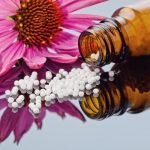Hypericum Perforatum: New Research
Four studies this month have showcased Hypericum perforatum (St. John’s wort) as beneficial as a unique treatment for some conditions that you’ve not considered. St. John’s wort is commonly used for the treatment of depression. There has been a substantial amount of research to support the use of St. John’s wort for depression, even showing its effectivity to be better than pharmaceutical alternatives.1 But what about pain, nephropathy and as a chemoprotective agent against neuropathy?
Hypericum for Pain
A study from the Journal of Ethnopharmacology discusses St. John’s wort (SJW) as a traditional use for antinociceptive and analgesic in pain conditions, backing these claims with several studies conducted recently.2 It appears that low doses (5-100mg/kg) of SJW dry extracts (0.3% hypericins; 3-5% hyperforins) induce antinociception in acute and chronic hyperalgesic states – and may be beneficial to augment opioid analgesia.2 In vivo and in vitro studies showed that the main components responsible for this pain relieving effect are hyperforin and hypericin.
Hypericum for Renal Damage
SJW is known to have antioxidant and anti-inflammatory effects. This led a team of researchers to study its effects on kidney ischemia/reperfusion (I/R) damage.3 It utilized a murine model in which the right kidneys were removed and left kidney underwent ischemia and then reperfusion. Levels of Malondialdehyde (MDA), Glutathione (GSH), superoxide dismutase (SOD), catalase (CAT), and glutathione peroxidase (GSH-PX) were measured in the renal tissues. Blood Urea Nitrogen (BUN) and creatinin (Cre) were measured from serum. In the group treated with SJW (50mg/kg) levels, MDA decreased significantly while the SOD, CAT and GSH-PX enzyme activity increased. On histopathological exam, it was noted that tubular dilation and epithelial desquamation regressed in the SJW treated group. The conclusion of this study is that SJW is protective against acute renal I/R.3
In another study, this oxidative stress and inflammatory modulation effect also showed to be helpful in the treatment of diabetic nephropathy (DN).4 SJW was found to have a renoprotective effect against DN through reduction of oxidative/nitrosative stress, enhancement of antioxidant defense mechanisms, decline of inflammatory cytokines, antifibrotic, antiapoptotic and blood glucose lowering properties.4
Hypericum and Chemo-induced Neuropathy
The antioxidant potential of SJW on oxaliplatin-induced caspase-3 activity – a known mediator of cell apoptosis was considered in a recent study.5 The extract showed a significant antioxidant effect and was able to reduce caspase-3 activity in rat astrocytes after administration of oxaliplatin. The conclusion of the study was that SJW could be used as a novel therapeutic treatment for counteracting chemo-induced neuropathy.5
Sources:
- Ng QX, Venkatanarayanan N, Ho CY. Clinical use of Hypericum perforatum (St John’s wort) in depression: A meta-analysis. J Affect Disord. 2017;210:211-221. Doi: 10.1016/j.jad.2016.12.048.
- Galeotti N. Hypericum perforatum (St John’s wort) beyond depression: a therapeutic perspective for pain conditions. J Ethnopharmacol. 2017. pii: S0378-8741(16)31479-9. doi: 10.1016/j.jep.2017.02.016.
- Cakir M, Duzova H, Baysal I, et al. The effect of hypericum perforatum on kidney ischemia/reperfusion damage. Ren Fail. 2017;39(1):385-391. doi: 10.1080/0886022X.2017.1287734.
- Abd El Motteleb DM, Abd El Aleem DI. Renoprotective effect of hypericum perforatum against diabetic nephropathy in rats: Insights in the underlying mechanisms. Clin Exp Pharmacol Physiol. 2017; doi: 10.1111/1440-1681.12729.
- Cinci L, Di Cesare Mannelli L, Maidecchi A, et al. Effects of Hypericum perforatum extract on oxaliplatin-induced neurotoxicity: in vitro evaluations. Z Naturforsch C. 2017. pii: /j/znc.ahead-of-print/znc-2016-0194/znc-2016-0194.xml. doi: 10.1515/znc-2016-0194.
 Node Smith, associate editor for NDNR, is a fifth year naturopathic medical student at NUNM, where he has been instrumental in maintaining a firm connection to the philosophy and heritage of naturopathic medicine amongst the next generation of docs. He helped found the first multi-generational experiential retreat, which brings elders, alumni, and students together for a weekend campout where naturopathic medicine and medical philosophy are experienced in nature. Three years ago he helped found the non-profit, Association for Naturopathic ReVitalization (ANR), for which he serves as the board chairman. ANR has a mission to inspire health practitioners to embody the naturopathic principles through experiential education. Node also has a firm belief that the next era of naturopathic medicine will see a resurgence of in-patient facilities which use fasting, earthing, hydrotherapy and homeopathy to bring people back from chronic diseases of modern living; he is involved in numerous conversations and projects to bring about this vision.
Node Smith, associate editor for NDNR, is a fifth year naturopathic medical student at NUNM, where he has been instrumental in maintaining a firm connection to the philosophy and heritage of naturopathic medicine amongst the next generation of docs. He helped found the first multi-generational experiential retreat, which brings elders, alumni, and students together for a weekend campout where naturopathic medicine and medical philosophy are experienced in nature. Three years ago he helped found the non-profit, Association for Naturopathic ReVitalization (ANR), for which he serves as the board chairman. ANR has a mission to inspire health practitioners to embody the naturopathic principles through experiential education. Node also has a firm belief that the next era of naturopathic medicine will see a resurgence of in-patient facilities which use fasting, earthing, hydrotherapy and homeopathy to bring people back from chronic diseases of modern living; he is involved in numerous conversations and projects to bring about this vision.










